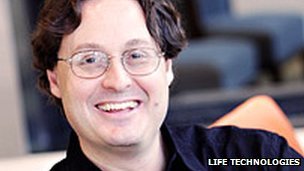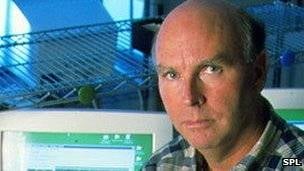ScienceRocks
Democrat all the way!
- Banned
- #1
Genetic entrepreneur to compete in Genomics X Prize
By Helen Briggs BBC News


By Helen Briggs BBC News
] Dr Jonathan RothbergGenetic make-up contributes to longevity
Continue reading the main story Related Stories
A race to unlock genetic clues behind living to 100 is set to begin next year, after a US team announced it will compete for the $10m Genomics X Prize.
Genetic entrepreneur Dr Jonathan Rothberg is entering the challenge to identify genes linked to a long, healthy life.
His team - and any other contenders - will be given 30 days to work out the full DNA code of 100 centenarians at a cost of no more than $1,000 per genome.
The race will start in September 2013.
Under the rules of the Archon Genomics X Prize, teams have until next May to register for the competition.
Dr Rothberg's team from Life Technologies Corporation in California is the first to formally enter the race.
Continue reading the main story[/URL

-
- Pioneer of DNA sequencing
- His latest business venture, Ion Torrent, makes the Personal Genome Machine and the Ion Proton sequencer
- Rothberg claims his machines can sequence DNA more quickly and cheaply than ever thought possible
- The Ion Proton sequencer will be used for the challenge
It is seen as the threshold at which DNA sequencing technology becomes cheap enough to be used widely in medicine, helping in diagnosis and in matching drugs to a patient's genetic make-up.
[URL="http://www.bbc.co.uk/news/science-environment-18876478#story_continues_3"]Continue reading the main story
-
Dr Craig VenterStart Quote
If they can do a human genome in two hours with one little machine, it's just stunning. We have come a long way.End Quote Dr Craig Venter Genetic entrepreneur
One hundred people aged 100 have donated their DNA for the project.
Scientists believe people who reach a very old age may have certain rare changes in their genes which protect against common diseases of later life, such as heart disease and cancer.
If these genes can be identified by analysing the DNA codes of centenarians, it will help scientists search for new medical treatments and perhaps ways to prolong life.
However, many sample DNA sequences will be needed in order to get the accuracy needed to pinpoint changes on the scale of a few genetic letters among the three billion in the human genome.
Continue reading the main story

-
- One of the scientists behind the effort to decode the first human genome sequence
- Venter and his team built the genome of a bacterium from scratch and put it into a cell to make a synthetic life form
- He has had his own DNA sequence decoded

